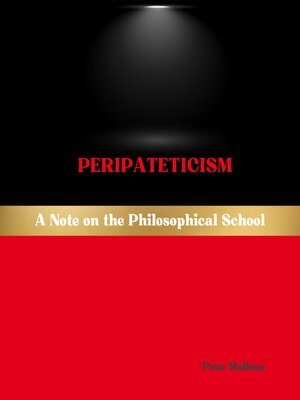Peripateticism
audiobook (Unabridged) ∣ A Note on the Philosophical School · Western Philosophical Schools
By Pons Malleus

Sign up to save your library
With an OverDrive account, you can save your favorite libraries for at-a-glance information about availability. Find out more about OverDrive accounts.
Find this title in Libby, the library reading app by OverDrive.



Search for a digital library with this title
Title found at these libraries:
| Library Name | Distance |
|---|---|
| Loading... |
This audiobook is narrated by a digital voice.
Peripateticism—derived from the Greek word peripatos, meaning "to walk about"—was more than a method of teaching or a historical footnote in the life of Aristotle; it was a dynamic philosophical tradition that sought knowledge in motion, discussion in open air, and wisdom grounded in both reason and experience. The Peripatetic school, founded by Aristotle in the Lyceum of Athens around 335 BCE, represents one of the most enduring and multifaceted philosophical movements of antiquity. This book is an invitation to walk alongside these thinkers, tracing the paths they carved through logic, ethics, metaphysics, politics, and the natural sciences.
Unlike other ancient philosophical schools that often clung tightly to doctrinal purity or metaphysical abstraction, the Peripatetics pursued a philosophy deeply engaged with the empirical world. At its heart lay Aristotle's conviction that all knowledge begins with the senses and moves through careful reasoning toward understanding. Whether studying the patterns of the heavens, the behavior of animals, the structure of the polis, or the virtues of the soul, the Peripatetics sought unity between theory and observation. Their intellectual style favored dialogue over dogma, evidence over speculation.
This audiobook does not merely recount the teachings of Aristotle, though he remains the towering figure of the school. It also explores the contributions of his successors—Theophrastus, Strato of Lampsacus, and later commentators like Alexander of Aphrodisias—who each extended and revised the school's doctrines in light of new discoveries and shifting cultural contexts. The Peripatetic tradition was never static; it evolved across centuries, influencing Islamic, Jewish, and Christian thinkers in the medieval world and echoing even into the foundations of modern science and logic.







